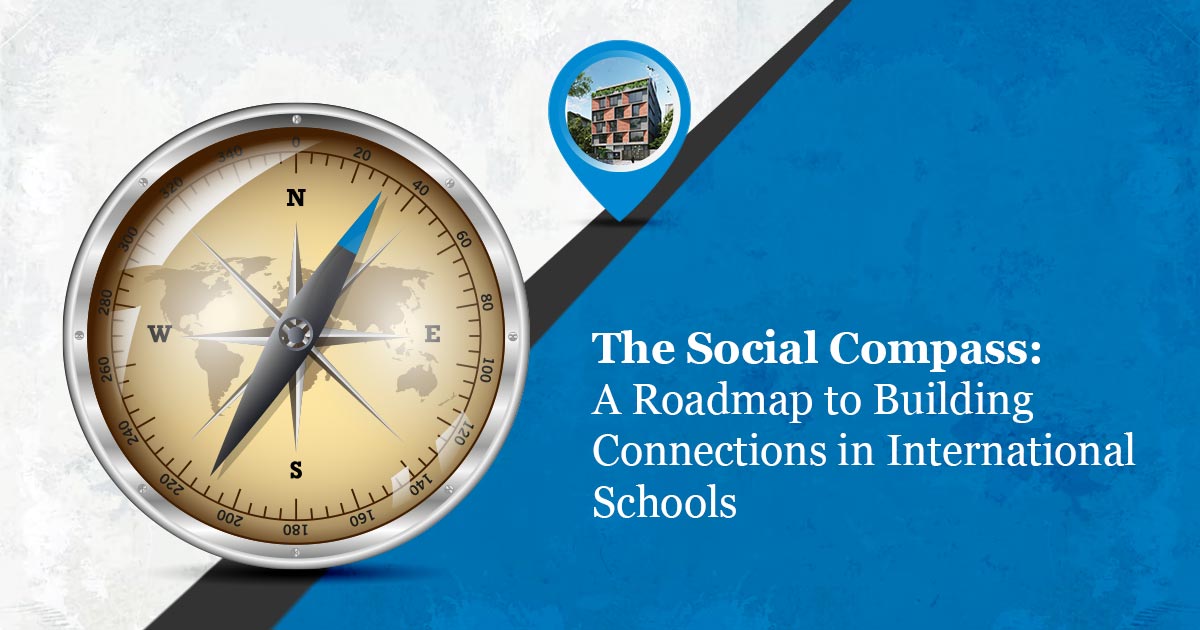International schools play an important role in providing a multicultural and diverse educational experience in today's globalised world. Learners from various backgrounds merge under one roof, resulting in a distinct social landscape. Building connections in such a setting can be difficult, but it is essential for cultivating a sense of belonging and creating a supportive community. In this blog, we will look at the concept of the "social compass" and how it can help learners, parents, and educators in international schools navigate the complexities of making meaningful connections.
Understanding the Social Compass
A social compass is a metaphorical tool that helps individuals navigate their way through social interactions and relationships. It provides direction, guidance, and a sense of purpose when it comes to building connections. In the context of international schools, the social compass takes on added significance due to the diverse cultural backgrounds and perspectives within the community.
The Four Cardinal Directions of the Social Compass
- North: Active Listening and Empathy Active listening is an essential skill for building connections in any environment. In international schools, where individuals bring their unique stories and experiences, active listening becomes even more crucial. Practising empathy allows us to understand and appreciate the perspectives of others, fostering deeper connections and mutual respect.
- East: Cultural Understanding and Sensitivity Cultural understanding is at the heart of building connections in international schools. learners, parents, and educators must embrace and celebrate the diversity present in the community. By being sensitive to cultural differences, individuals can create an inclusive environment where everyone feels valued and respected.
- South: Collaboration and Cooperation Collaboration and cooperation are vital elements of building connections in international schools. By working together, learners can learn from each other's strengths, develop intercultural competence, and create meaningful relationships that extend beyond the classroom. Encouraging teamwork and collaboration fosters a sense of unity and shared purpose.
- West: Effective Communication and Language Skills Effective communication is the bridge that connects individuals from different cultural backgrounds. International schools are often multilingual environments, making language skills a valuable asset. By improving their communication and language abilities, learners can break down barriers and build stronger connections with their peers, educators, and the broader community.
Navigating the Social Compass
Learners:-
Participate in extracurricular activities: Joining clubs, sports teams, and cultural events provides opportunities to interact with peers who share similar interests. It allows learners to connect on a deeper level beyond academics.
Show curiosity and respect: Ask questions, show genuine interest, and respect cultural differences when engaging with classmates. This openness and curiosity promote understanding and create an inclusive atmosphere.
Seek common ground: Identify shared experiences, hobbies, or passions that can serve as a basis for connection-building. Finding commonalities helps foster connections and build relationships based on shared interests.
Parents:-
- Engage in school activities: Attend parent-educator meetings, cultural events, and volunteer opportunities to interact with other parents. Engaging in these activities provides parents with opportunities to meet and connect with other parents in the school community.
- Foster open communication: Initiate conversations with fellow parents, exchange contact information, and create channels for ongoing communication. Open communication channels help parents connect and support each other in various aspects of their children's education.
- Encourage playdates and social gatherings: Facilitate opportunities for your child to interact with classmates outside of school, fostering deeper connections. Organising playdates or social gatherings help learners develop friendships outside the classroom and strengthens their social bonds.
Educators:-
- Create a supportive classroom environment: Promote respect, inclusivity, and collaboration within the classroom setting. By establishing a safe and supportive environment, educators encourage learners to build connections with their peers and engage in meaningful interactions.
- Facilitate cross-cultural exchanges: Organise activities that encourage learners to share aspects of their culture, fostering a deeper understanding among peers. By creating opportunities for cultural exchange, educators facilitate connections and promote appreciation for different backgrounds.
- Promote diversity in the curriculum: Incorporate diverse perspectives, literature, and experiences into the curriculum to encourage cultural awareness and appreciation. By embracing diversity in the curriculum, educators create a space that values and celebrates different cultures, fostering connections among learners.
Building connections in international schools is a multifaceted process that requires active engagement, cultural understanding, effective communication, and collaboration. By following the guidance of the social compass, learners, parents, and educators can navigate this complex terrain and create a vibrant and inclusive community. International schools have the potential to become microcosms of the global society, where individuals from different cultures come together, learn from each other, and build connections that can last a lifetime. Through empathy, cultural sensitivity, collaboration, and effective communication, the social compass can serve as a roadmap for creating a supportive and connected environment within international schools, enhancing the educational experience for all stakeholders involved. By prioritising the cardinal directions of active listening, cultural understanding, collaboration, and effective communication, international schools can truly become nurturing spaces that empower learners to thrive in a multicultural world.
